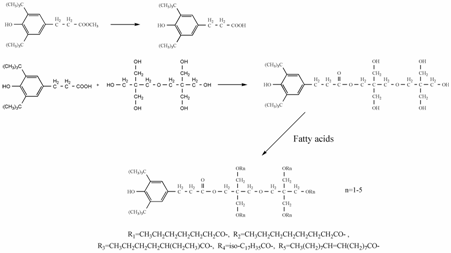Synthetic ester, which is a very important ramification in lubricating oils, has been available used as lubricants for a long time. According to Zisman, the first synthetic esters were developed in Germany during World WarⅡ, when the available hydrocarbon fluids could not satisfy the demands for aircraft engine oils.
Synthetic esters with their good lubrication and biodegradable non-toxic properties offer an attractive option. But a limitation of the use of synthetic esters in their applications is their poor stability against oxidation and thermal degradation. Antioxidant is a kind of indispensable additive in lubricating oil, allowing the oils to avoid or temporally delay oxidative process.
The research group headed by Prof. Wumanjiang Eli at Xinjiang Technical Institute of Physics and Chemistry (XTIPC), Chinese Academy of Sciences (CAS) developed an efficient and flexible route for the synthesis antioxidant-modified synthetic esters. These antioxidant-modified esters have a distinct advantage,that is, they are not only used as lubricating base oils, but also used as effective antioxidants for lubricant additive. These modified esters have better thermal stability and longer oxidation induction time (OIT) than traditional esters.
The results have been published in Lubrication Science,this work was supported by the National Key Technology R & D Program (NO. 2010BAE91B00).

Scheme 1 the experimental process
